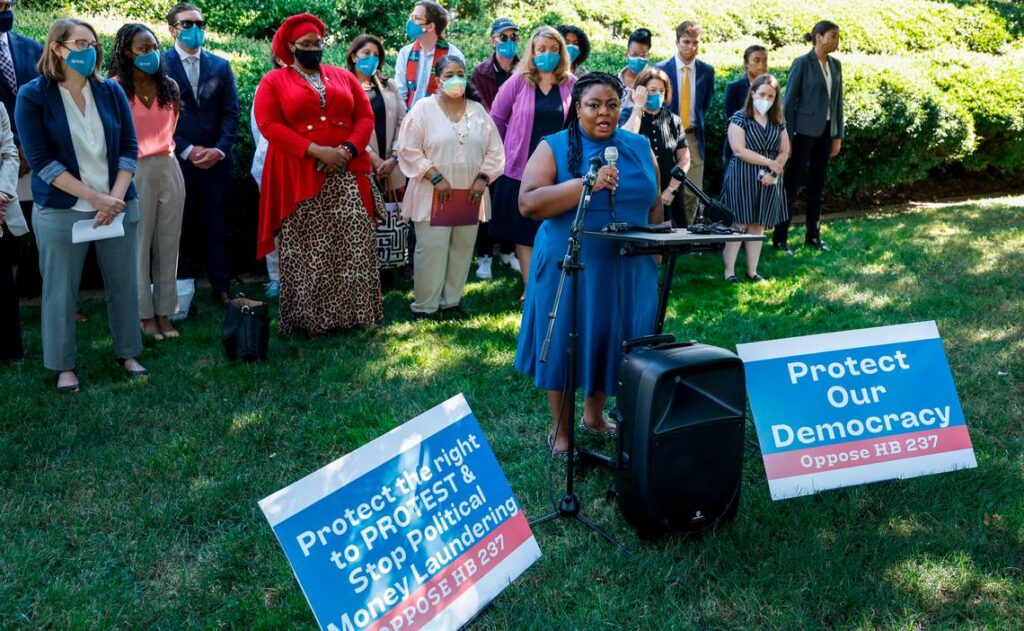Hidden behind the mask bill are changes to campaign finance laws that critics say amount to money laundering and could give Republican candidates an advantage in the next election.
This provision would remove existing limitations on the amount of money that federal political committees can contribute to state campaigns. Current law does not allow corporations to contribute to political campaigns in North Carolina, so certain federal political committees that receive funding from corporations cannot give money to state committees.
But what does that mean exactly? What does it do and who does it benefit?
The reforms proposed by Republican lawmakers would allow wealthy donors to get around individual contribution limits by simply giving large sums of money to federal committees, which can then use state party committees as vehicles to give directly to candidates, and would not have to disclose the purpose of their donations, preventing voters from knowing exactly who is funding these campaigns.
Democrats say this is a ploy to help Lt. Gov. Mark Robinson's gubernatorial campaign. The race between Robinson and Attorney General Josh Stein is expected to be one of the most expensive in the country, with Stein far outraising Robinson.
That could be because wealthy Republican donors are reluctant to be associated with Robinson and his history of hateful and dangerous rhetoric, and some GOP consultants have expressed concern that Robinson's comments could be politically harmful to the party in the November election.
These changes would allow a donor to, say, give millions of dollars to the Republican Governors Association, which could then donate the money to the North Carolina Republican Party, which could then donate it directly to Robinson's campaign, or the campaign of any other Republican candidate. The public would know that the donor gave a large amount to the Republican Governors Association, but they wouldn't have to disclose the fact that the money ended up in North Carolina.
Interestingly, this proposed change came just days after the Steen campaign ran a seven-figure TV ad highlighting Robinson's anti-abortion views — suggesting Robinson may not have the financial wherewithal to respond in a similar way, at least not while he is lagging behind in fundraising.
Those committees could always buy ads on Robinson's behalf, but as freelance journalist Judd Legum pointed out in the Newsletter, there's an advantage to Robinson buying the ads himself: Candidates get discounted rates when they buy ad space directly.
“Any attempt to change election rules in the middle of an election, especially one as important as this one, should be viewed with suspicion. It's like trying to change the rules of basketball because you don't like the way the game is playing: it's unfair and immoral. It's also suspicious that this change was slipped into an unrelated bill at the last minute, with limited opportunity for discussion and debate.
Republican lawmakers say the change is necessary for a “level playing field” after the North Carolina State Board of Elections issued an advisory opinion in 2020 allowing the Democratic Governors Association to use non-corporate accounts to send money to the state party. The Democratic Governors Association is allowed to do so under state law because it keeps its corporate contributions in separate accounts from individual contributions. Of course, Republicans could do the same if they wanted to separate their contributions, but they currently don't.
During a committee hearing on Tuesday, Democrats questioned the timing of the changes, given that it's been four years since the advisory opinion was issued.
“Well, it will certainly take some time before we know the outcome of this opinion,” said Rep. Gray Mills, D-N.Y., chairman of the House Election Law and Campaign Finance Reform Committee.
There is also an element of hypocrisy here, given that Republican lawmakers have suggested that “dark money” and “unrealistic billionaires” are helping Democrats win elections.
Of course, Democratic candidates could benefit from this change if they wanted to. But that doesn't mean they're allowed to. Dark money is a concern regardless of its source or recipient because it sways the outcome of elections and allows for undue influence from the wealthy, even if they don't live in the United States.



